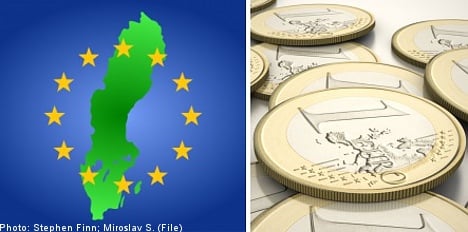Both members of the European Union, the two Scandinavian countries have refused to adopt the single currency.
For Sweden, the choice appears to have been the right one for now: it posted economic growth of 4.6 percent in the third quarter, compared to just 0.2 percent in the eurozone.
Its trade surplus soared by 41.8 percent in October from the same month a year earlier, while industrial production rose by 4.7 percent during the same period.
But Sweden’s export-heavy economy has slowed dramatically in recent weeks and central bank forecasts show growth shrinking to just 1.3 percent in 2012.
“There has been a fall in orders to Swedish export companies, and exports will be much weaker next year,” the bank said on December 20, predicting that households and businesses would postpone spending and investments.
Lower demand is also expected to “affect the labour market and unemployment will increase somewhat in the year ahead,” the central bank said. In November, the country’s jobless rate stood at 6.7 percent.
Sweden is considered to have among Europe’s strongest public finances, but it “will not be unaffected by a general European crisis and it is in our interest to be part of a European solution,” Finance Minister Anders Borg told AFP recently, insisting the country needs a seat at the table where a solution to the turmoil is hammered out.
Denmark, meanwhile, has been suffering from the effects of the crisis for several quarters and is now on the verge of recession.
In the third quarter, the Danish economy shrank by 0.8 percent, and economists expect it to shrink again in the fourth quarter, technically putting Denmark in recession.
Due to the weak outlook, the government has increased its public deficit forecast for 2012 to 5.5 percent of gross domestic product, or 100.7 billion kroner ($17.7 billion) — up from the 96 billion previously anticipated.
The widening of the debt was attributed to an expected decrease in tax revenue and increased spending on unemployment and social benefits, Finance Minister Bjarne Corydon said.
Given the state of play in Europe, Swedes and Danes have expressed robust opposition to the euro.
Recent polls suggest 87.6 percent of Swedes and 71 percent of Danes want to hold onto their own currencies.
“Swedish confidence in the euro has never been as low,” polling institute Skop said, noting that “support for the euro has been in a downward trend the past two years.”
“The European debt crisis has had an impact on Danish public opinion about the euro,” Danske Bank chief economist Steen Bocian said, recalling that in September 60 percent of Danes were opposed to adopting the euro.
Sweden rejected the euro in a 2003 referendum. Denmark also voted against the adoption of the single currency, but unlike Sweden it negotiated an opt-out on the euro with Brussels.
The Danish krone is linked to the euro through a fixed exchange rate policy that allows the krone to fluctuate within a 2.25-percent range, and Denmark’s central bank ensures that the gap between its interest rates and those of the eurozone is never too wide.
“The system works very well,” Bocian said, even if “it’s a strange construction” that is not meant to be a long-term arrangement.
“It could be advantageous right now” to not be a member of the eurozone, “but at the beginning of the crisis, in 2008, it was costly (for Denmark) to be outside,” he said.



 Please whitelist us to continue reading.
Please whitelist us to continue reading.
Member comments